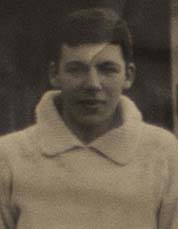 Richard Turner was the only son of Reverend Richard Turner, Vicar of Barnstaple, Devon, and Lydia Lucy, the daughter of Daniel Radford of Tavistock, Devon. He was born on 29th March 1896, and was sent to the school in 1910 as a King’s Scholar.
Richard Turner was the only son of Reverend Richard Turner, Vicar of Barnstaple, Devon, and Lydia Lucy, the daughter of Daniel Radford of Tavistock, Devon. He was born on 29th March 1896, and was sent to the school in 1910 as a King’s Scholar.
He played both cricket and football, representing the King’s Scholars as goalkeeper: he was described as doing “all that was necessary in goal, though at times rather slow in clearing”.
In the 1913 Latin play — the Andria — he played the role of Simo, and received the following review:
“The part offers such temptations to an actor to roar himself hoarse and the audience deaf, and Mr. R. R. Turner did neither of these things. He put some real emotion into Simo. His anger was the more credible, because restrained. He left himself plenty of scope within which to work up to the climax of indignation, with the result that he sustained the interest and kept his voice. Moreover his movements were easy, restful and dignified.”
Richard was an accomplished writer; he was the winner of the 1914 Duke of Devonshire’s Essay Prize that was open to all Public Schools, and he also won the Gumbleton Prize for English Verse with his poem on Icarus.
He was involved in the Officer Training Corps and shooting, and was successful in the practical examination — Certificate A — in March 1914.
He was awarded the school’s Triplett Scholarship when he left the school in December 1914, and he went on as a scholar to New College, Oxford.
He enlisted as 2nd Lieutenant, 3rd (Reserve) Battalion Royal Sussex Regiment on the 20th January 1915, and was attached to the 12th (Service) Battalion Royal Sussex Regiment. He landed at Le Havre in March 1916, but was wounded on the 9th and 27th of April. He returned to the western front in December 1916. Richard was only 20 when he was killed in action near Vlamertinghe on 3rd February 1917.